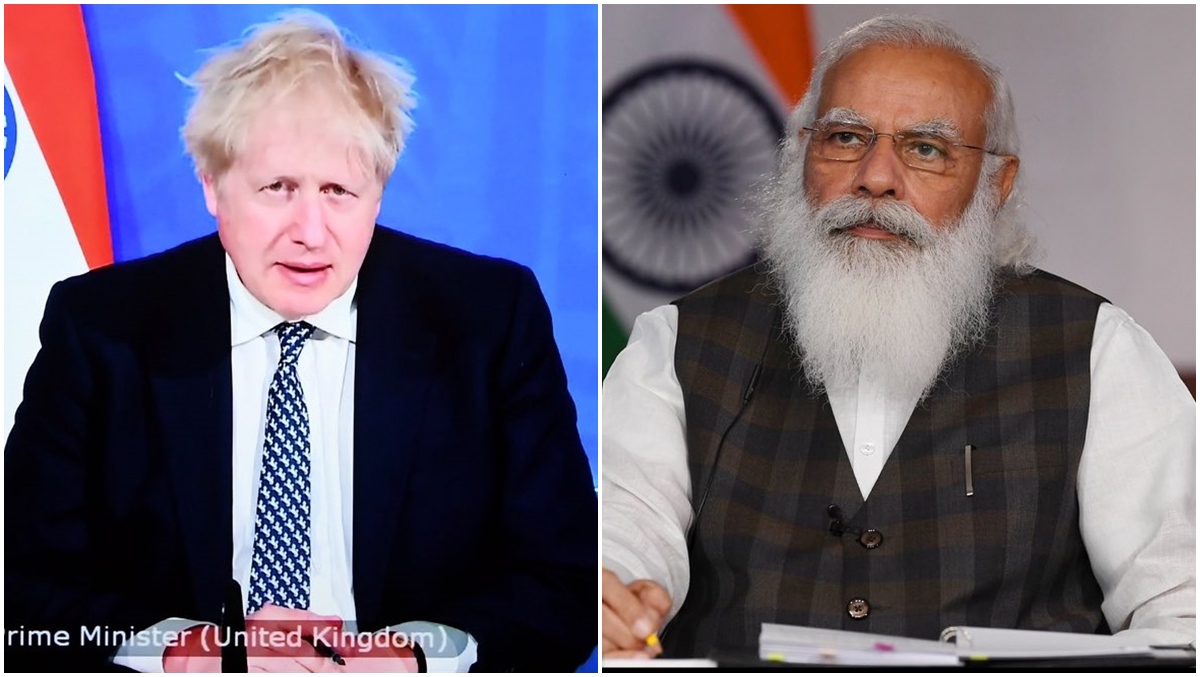
INDIA AND the UK on Tuesday adopted an ambitious ‘Roadmap 2030’ during the virtual bilateral summit between Prime Minister Narendra Modi and his British counterpart Boris Johnson that will elevate bilateral ties to a “Comprehensive Strategic Partnership”.
The two leaders discussed the Covid-19 situation and ongoing cooperation in the fight against the pandemic, including the successful partnership on vaccines. Modi thanked Johnson for the prompt medical assistance provided by the UK in the wake of the severe second wave of Covid-19 in India.
They also launched Enhanced Trade Partnership, and announced their intent to negotiate a comprehensive Free Trade Agreement (FTA), including consideration of an interim trade agreement to deliver early gains. “They agreed to continue removing trade barriers on the path to an FTA, and an ambitious target of more than doubling India-UK trade by 2030,” a joint statement said.
The two leaders agreed to strengthen defence partnership, focusing on maritime and industrial collaboration. They also reaffirmed the benefits of closer cooperation in a free and open Indo-Pacific, recognising their shared interest in regional prosperity and stability.
They agreed to significant new cooperation on Maritime Domain Awareness, which includes new agreements on maritime information sharing, an invitation to the UK to join India’s Information Fusion Centre in Gurgaon and an ambitious exercise programme which includes joint trilateral exercises.
The two countries are also working to conclude a Logistics Memorandum of Understanding that will enhance joint ability to tackle shared challenges, the statement said.
In addition to commitments on the Indo-Pacific, the two countries agreed to build on existing government-to-government collaboration on India’s future combat air engine requirement.
As part of the ‘Roadmap 2030’, they agreed to work closely together in support of India’s indigenous development of the Light Combat Aircraft Mark 2. They also discussed the potential for further industrial collaboration in areas such as maritime propulsion, space and cyber, marking the start of a promising new era of UK-India research, capability and industrial collaboration on Indian combat air and beyond.
Johnson said, “The UK and India share many fundamental values. The UK is one of the oldest democracies, and India is the world’s largest. We are both committed members of the Commonwealth. And there is a living bridge uniting the people of our countries.”
“In the last week, the British people have stepped up in their thousands to support our Indian friends during this terrible time in a demonstration of the deep connection between the UK and India,” he said. “This connection will only grow over the next decade as we do more together to tackle the world’s biggest problems and make life better for our people. The agreements we have made today mark the beginning of a new era in the UK-India relationship.”
Modi tweeted, “Had a productive Virtual Summit with my friend UK PM @BorisJohnson. We adopted an ambitious Roadmap 2030 for elevating India-UK ties to a Comprehensive Strategic Partnership.”
The ‘Roadmap 2030’ will provide a framework for UK-India relations across health, climate, trade, education, science and technology, and defence. This will expand the UK-India health partnership to enhance global health security and pandemic resilience. This includes firming up international supply chains to ensure critical medicines, vaccines and other medical products reach those who need them most, a statement said.
The two countries agreed to work together to ensure an ambitious outcome at COP26 and expand the UK-India partnership on tackling climate change, including by accelerating the development of clean energy and transport and new technology, protecting nature and biodiversity and helping developing countries adapt to the impact of climate change.
“They will also cooperate closely to tackle threats to our shared security in all their forms. The UK’s Carrier Strike Group will visit India later this year to boost this work with our navies and air forces undertaking joint training exercises to enable future cooperation on operations in the Western Indian Ocean,” the joint statement said.
They will also enhance our migration relationship, to make it easier for British and Indian nationals to live and work in each other’s countries,” the statement said.



